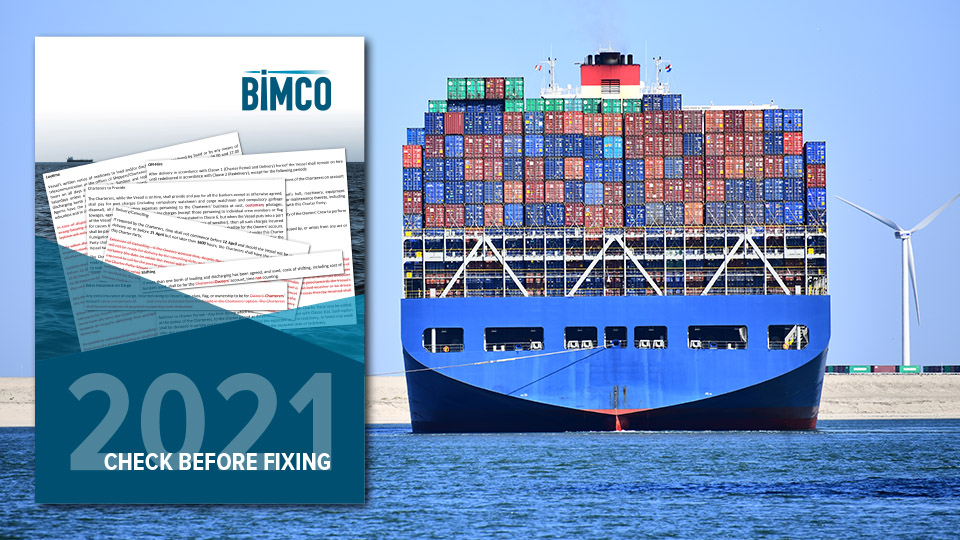North American Advance Cargo Notification Clause for Time Charter Parties 2016
Overview
North American Advance Cargo Notification Clause for Time Charter Parties 2016
BIMCO North American Advance Cargo Notification Clause for Time Charter Parties 2016
1. US Notification Requirements for Time Charter Parties
(a) If the Vessel loads or carries cargo destined for the US or passing through US ports in transit, the Charterers shall comply with the current US Customs regulations (19 CFR 4.7) or any subsequent amendments thereto and shall undertake the role of carrier for the purposes of such regulations and shall, in their own name, time and expense:
(i) Have in place a SCAC (Standard Carrier Alpha Code);
(ii) Have in place an ICB (International Carrier Bond);
(iii) Provide the Owners with a timely confirmation of (i) and (ii) above; and
(iv) Submit a cargo declaration by AMS (Automated Manifest System) to the US Customs and provide the Owners at the same time with a copy thereof.
(b) The Charterers assume liability for and shall indemnify, defend and hold harmless the Owners against any loss and/or damage whatsoever (including consequential loss and/or damage) and/or any expenses, fines, penalties and all other claims of whatsoever nature, including but not limited to legal costs, arising from the Charterers’ failure to comply with any of the provisions of sub-clause (a). Should such failure result in any delay then, notwithstanding any provision in this Charter Party to the contrary, the Vessel shall remain on hire.
(c) If the Charterers' ICB is used to meet any penalties, duties, taxes or other charges which are solely the responsibility of the Owners, the Owners shall promptly reimburse the Charterers for those amounts.
(d) The assumption of the role of carrier by the Charterers pursuant to this Clause and for the purpose of the US Customs Regulations (19 CFR 4.7) shall be without prejudice to the identity of carrier under any bill of lading, other contract, law or regulation.
2. Canadian Notification Requirements for Time Charter Parties
(a) As between Owners and Charterers, Charterers shall be deemed to be the Conveyance Operating Carrier for the purposes of the Canada Customs Act and any related regulations, memorandums or notices issued by the Canada Border Services Agency (“CBSA”).
(b) Subject to sub-clause (c) below, Charterers will be responsible for obtaining a Marine Carrier Code (Bonded or Non-Bonded) as may be required and for providing the CBSA with the Advance Commercial Information by Electronic Data Interchange or otherwise on a timely basis.
(c) When the vessel calls at a port in Canada other than as instructed by Charterers, Owners shall provide Charterers with all information necessary for the timely and accurate submission of Advance Commercial Information to the CBSA.
(d) Each party shall indemnify the other party for any and all fines, penalties, expenses, loss, damage, delay or any other claim, including attorney’s fees, arising from its failure to comply with this clause.
(e) For the avoidance of doubt, nothing contained in this clause is intended to vary any other provision of this charter as to responsibility for cargo and identity of carrier.
Explanatory notes
Clauses for voyage and time charter parties, originally developed in 2004 in response to US Customs’ requirements for the advance submission of cargo manifest information, were reissued in 2010 to reflect the introduction of parallel arrangements in Canada.
However, further changes have now been made in Canada. New regulatory procedures set out requirements for the designation of a “Conveyance Operating Carrier” as the party responsible for obtaining a Marine Carrier Code and providing the Canada Border Services Agency (CBSA) with commercial information in appropriate electronic format and on a timely basis. The Conveyance Operating Carrier is defined as the party having control of the vessel’s employment and will, therefore, normally be the owner or time charterer.
The Marine Carrier Code can be either bonded or non-bonded. A bond is required whenever unreleased goods move beyond the first port of arrival in Canada. However, the rules for determining the first port of call are complex and putting into port in an emergency or other unplanned first call will require a bonded code. Carriers are therefore strongly recommended to apply for a bonded code in order to cover all contingencies and avoid delays in the event of an unforeseen occurrence or changed itinerary. Further information about bonded and non-bonded codes is available on the “marine carrier” section of the CBSA website.
The present North American Clauses combine US and Canadian requirements in one all-embracing provision with applicable differences addressed through alternative procedures set out in the body of the text. While the underlying principles remain the same in both Canada and the USA, there are now distinct procedural differences between the two administrations’ regulatory requirements. Nevertheless, as the concept of a North American Advance Cargo Declaration Clause is already widely accepted and used by market practitioners, a single clause has been maintained for both the voyage charter and time charter party versions. However, the clause has been reformatted into two sub-clauses – the first covering the unchanged regulatory arrangements in the USA and the second setting out the updated procedures in Canada. An additional, and new, clause has been developed for use in bills of lading in liner trades to Canada.
Detailed provisions for requirements in Canada
1. Voyage Charter Parties
Sub-clause (a) provides that the owners shall be the Conveyance Operating Carrier for the purposes of CBSA requirements;
Sub-clause (b) Owners must obtain the appropriate form of Marine Carrier Code, either Bonded (as recommended) or Non-bonded, and must provide CBSA with Advance Cargo Information in the appropriate electronic format and on a timely basis;
Sub-clause (c) Charterers must provide all necessary information to enable owners to comply with their obligations to provide Advance Cargo Information;
Sub-clause (d) is a mutual indemnity in the event of either party’s failure to comply with the provisions of the clause; and
Sub-clause (e) provides that the clause does not vary party rights and obligations, including any identity of carrier provision, in the underlying charter party.
2. Time Charter Parties
Sub-clause (a) provides that the charterers shall be the Conveyance Operating Carrier for the purposes of CBSA requirements;
Sub-clause (b) holds charterers responsible for obtaining the appropriate Bonded or Non-Bonded Carrier Code and for the transmission of information to CBSA;
Sub-clause (c) modifies charterers’ obligations where a vessel calls at any Canadian port other than in accordance with charterers’ orders. In such event, owners must provide charterers with all necessary information so that they may submit Advance Cargo Information to CBSA;
Sub-clause (d) is the standard indemnity; and
Sub-clause (e) provides that the clause does not vary party rights and obligations, including any identity of carrier provision, in the underlying charter party.
3. Liner Bills of Lading
The content is modelled on the Voyage Charter Party Clause but the terms “Carrier” and “Shipper” are used respectively in place of “Owners” and “Charterers”.
Originally published in BIMCO Special Circular No. 8, December 2015 - Revised North American Advance Cargo Declaration Clauses
Related Help & Advice
Create or edit a contract
The one-stop digital shop for all the standard maritime contracts and clauses you’ll ever need.
Latest Related News
-
BIMCO adopts portfolio of four ETS clauses
The shipping industry is facing an increase in new regulations from the International Maritime Organization (IMO) and the European Union (EU) and an increase in the urgency to decarbonise. To support the industry, BIMCO has developed a portfolio of new emission trading scheme (ETS) clauses.
-
BIMCO adopts new CII clause for Voyage Charter Parties
The shipping industry is facing an increase in new regulations from the International Maritime Organization (IMO) and the European Union (EU) and an increase in the urgency to decarbonise. To support the industry, BIMCO has developed a new CII Clause for Voyage Charter Parties. The clause was adopted by BIMCO’s Documentary Committee on 11 October and is the latest addition to BIMCO’s portfolio of carbon clauses.
-
BIMCO’s CII clause adopted
The BIMCO Documentary Committee has adopted a CII Operations Clause for Time Charter Parties which will help the industry commercially navigate the complexities of the new CII regulations from the International Maritime Organization (IMO).
-
Fumigation
BIMCO providing information and guidance relating to fumigation of cargoes that are shipped under the IMSBC Code, the Grain Code and the IMDG Code.
-
Bottom fouling
From time to time, BIMCO is approached by members enquiring about responsibility for the cleaning of a ship’s underwater parts when it has been idle at a port for a long time pursuant to the orders of the time charterers.
ELSEWHERE ON BIMCO
Holiday calendar
BIMCO's Holiday Calendar covers general holidays in over 150 countries, plus local holidays and working hours in more than 680 ports around the world.
Learn about your cargo
For general guidance and information on cargo-related queries.




